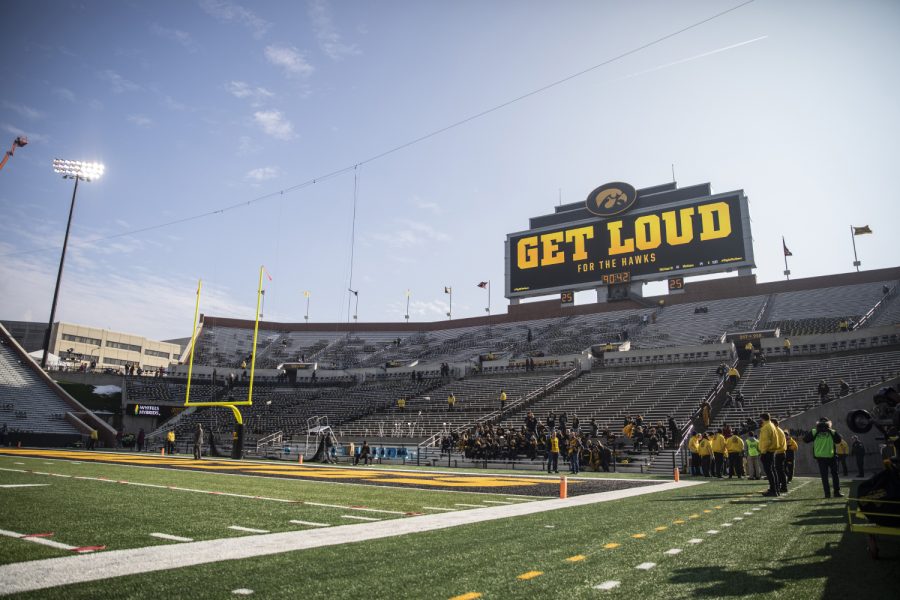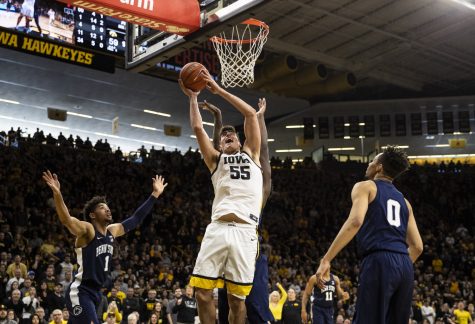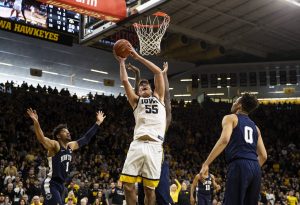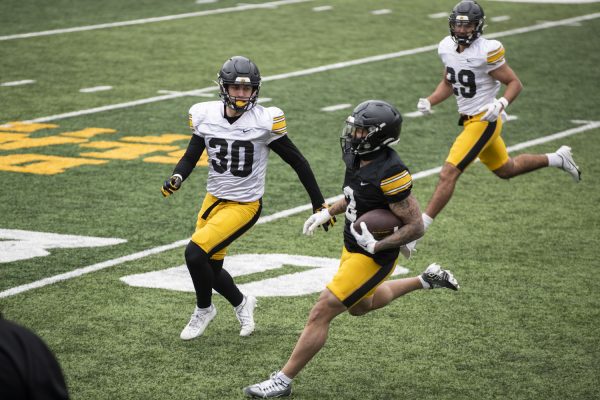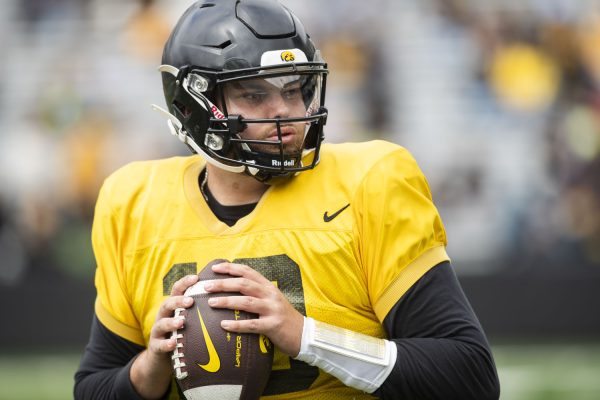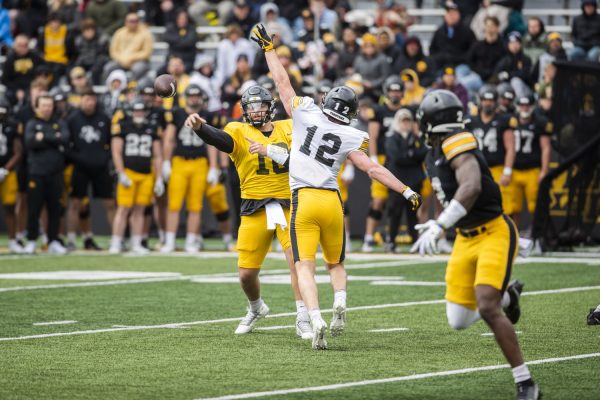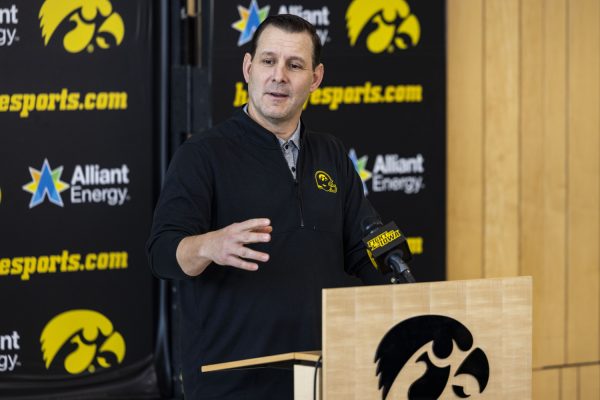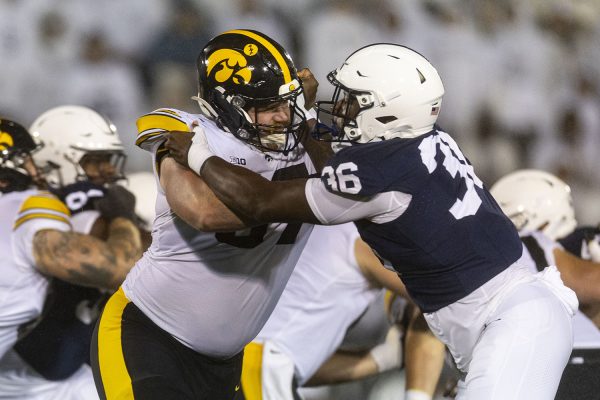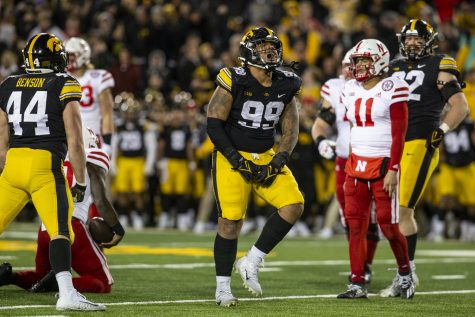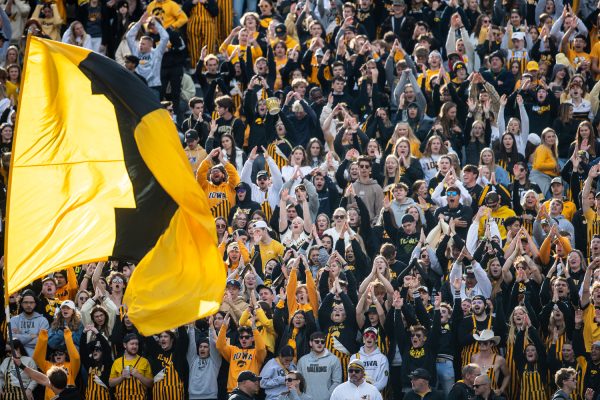Big Ten athletic departments taking different approaches to football ticket sales, stadium capacity limits for the fall
Ohio State announced Tuesday that only 20 percent of Ohio Stadium’s capacity will be allowed at games this fall if a season takes place.
The south end of Kinnick Stadium is seen before a football game between Iowa and Minnesota on Saturday, November 16, 2019. The Hawkeyes defeated the Gophers, 23-19. (Ryan Adams/The Daily Iowan)
July 28, 2020
There are a lot of questions surrounding the upcoming college football season amid the COVID-19 pandemic. One of the biggest is whether or not fans will be allowed to attend games if the season does take place.
Across the Big Ten, athletic departments have taken different approaches in trying to answer that question.
The Daily Iowan took a look at what the 14 athletic departments in the conference have said about ticket sales and potential capacity limits for football games in 2020.
Iowa
The Iowa athletics department announced June 22 that it was pausing 2020 football season ticket sales. Only individuals who have renewed season tickets and completed per-seat contributions by June 30 will be included in potential Kinnick Stadium seating plans.
At the time of the announcement, Iowa had sold roughly 40,000 season tickets, including student tickets. Kinnick Stadium can seat 69,250 fans.
In the release, Athletic Director Gary Barta said that a plan for reduced capacity seating was anticipated to be released by late July, though the option to accommodate as many Hawkeye fans who were comfortable attending the game was still on the table.
“Hawkeye fans are excited for the upcoming season and we truly appreciate their continued enthusiasm and support,” Barta said in the release. “With the current information available, we needed to pause additional sales and start focusing on reduced capacity seating models based on our season ticket holders.”
Illinois
The Fighting Illini announced July 16 that, in line with state guidance, the school will limit Memorial Stadium’s capacity — which is listed at 60,670 — to 20 percent this season. Social distancing and reserved seating protocols will be in place.
Face coverings will be required in public areas and tailgating will be banned at games in 2020.
Indiana
Indiana is continuing to sell football tickets. In early June, athletic director Scott Dolson said he was unsure how many fans would be in attendance at home games in the fall. He said that as Indiana continues to sell tickets, the department has contingencies in place depending on how the pandemic develops.
“You hope that it is normal, but you have to prepare as if it is not, and we’ve got 29 areas that we’ve identified that we have to come up with a plan in each of these areas from a social distancing standpoint,” Dolson said on a podcast in early June with announcer Don Fischer. “What we are doing is we want to make certain that our fans are confident that we’ve got the plan in place from a health and safety standpoint.”
Maryland
Maryland has not paused football ticket sales or announced a plan regarding how many fans will be allowed at home games for the 2020 season.
Michigan
The Michigan athletics department announced July 15 that if the school is able to participate in a football season, the capacity of Michigan Stadium will be reduced, or games could be held without fans as a result of the COVID-19 pandemic.
In a release, Michigan said the final decision on capacity will be made at a later date in consultation with medical experts, university leadership, the Big Ten Conference, and government officials/agencies.
RELATED: Iowa Athletics Department reports latest round of COVID-19 testing results
“We have been working closely with a wide variety of leaders to ensure a safe and healthy environment for our student-athletes, coaches, fans and support staff associated with a game at Michigan Stadium,” Athletic Director Warde Manuel said in a release. “We will follow the direction that all of these agencies and experts continue to provide during this challenging time.”
As a result of this announcement, Michigan will not be selling season football tickets. Tickets for home games will be sold on an individual basis. Sales will be limited to current season ticket holders and students.
Michigan State
Michigan State athletic director Bill Beekman announced June 24 that the school had paused its season and student ticket sales for the 2020 football season. He said the number of fans allowed into Spartan Stadium this season will likely be reduced.
The school is giving those who have already paid for tickets but no longer plan on attending games in the fall three options — convert payments to a charitable donation, apply payments to 2021, or request a refund.
Minnesota
Minnesota has not paused ticket sales but has given season-ticket holders options to donate their tickets to the Golden Gopher Fund, roll their tickets over to 2021, or get a full refund if they no longer feel comfortable attending a game. No announcement has been made about potential capacity restrictions this season.
Nebraska
Nebraska has not paused football season ticket sales or announced a plan for reduced capacity for the 2020 season. Nebraska Gov. Pete Ricketts said at a press conference June 15 that he was hoping to see a full Memorial Stadium this fall.
Northwestern
Northwestern has not paused football ticket sales or announced a plan regarding how many fans will be allowed at home games for the 2020 season.
Ohio State
Ohio State athletic director Gene Smith said in an email to season-ticket holders Tuesday that the school will limit home crowds to 20 percent capacity — about 20,000 people — and prohibit tailgating if the football season is played this fall.
Fans inside Ohio Stadium will be required to wear masks and follow social distancing guidelines to help mitigate the spread of COVID-19.
According to Buckeyes Wire, earlier this summer Smith discussed possibilities for seating in the fall.
“Obviously, we’re fortunate 100,000 seats in the stadium,” Smith said. “So, could we implement the current CDC guidelines, the state guidelines around physical distancing, mask requirements, and all those types of things in an outdoor environment and have obviously significantly less fans than what we are used to? I think it’s possible.
“I just feel like we have the talent, skill, and space capacity to provide an opportunity for a certain number of fans to have access to our particular stadium. Of course, that wouldn’t be true across the country because of capacity. But I think we can get there.”
Penn State
According to 247 Sports, Penn State Vice President for Intercollegiate Athletics Sandy Barbour said July 1 that the athletics department is expecting reduced crowds at all of its facilities when contests are able to resume. She did not provide specific numbers for what crowds could look like.
Barbour did say that it was unlikely that a fan would be able to go to a game in 2020 without purchasing season tickets as single-game ticket sales may not be an option. Penn State hosted an average of 105,678 spectators last season.
“I don’t think [a full stadium] is in the cards for us this season,” Barbour said on a teleconference July 1. “So again, the different scenarios we’re looking at would be to try to accommodate as many of our season ticket holders as we possibly can.”
The Daily Collegian reported that Penn State students received an email in June that student ticket sales have been paused until an official plan is in place regarding seating at Beaver Stadium this fall.
Purdue
Purdue has not released any ticket information regarding its policy for the 2020 season but did say in a statement that it will try to accommodate as many season-ticket holders as it can in a safe manner.
RELATED: UI Athletics Department pauses football ticket sales for 2020 season
Purdue President Mitch Daniels testified remotely June 4 before the U.S. Senate on Health, Education, Labor and Pension Committee, and fielded questions about the school’s plans for how many spectators will be allowed to attend home football games.
“Can’t speak for any others, but we are not looking at going beyond one-fourth of the capacity of our 57,000 seat stadium right now,” Daniels told the committee. “This has been mapped out just as we have mapped our classrooms and dorm rooms to measure distance and exceed the requirements.”
According to the Lafayette Journal and Courier, Purdue athletic director Mike Bobinski issued a statement later that day saying the 25 percent capacity could be adjusted.
Rutgers
The Rutgers athletics department announced July 20 that all venues — including the football stadium — will operate in accordance with the executive orders issued by New Jersey Gov. Phil Murphy limiting outdoor gatherings to 500 people or fewer.
“We understand and support the Governor’s decision based on health and safety guidelines,” Rutgers said in a release. “Athletic department officials will continue to monitor any changes to public health guidelines and adjust accordingly. Additionally, the Big Ten Conference announced earlier this month a plan to move fall sports to a conference-only schedule. Details regarding such schedule shall be forthcoming.
“Season ticket holders will receive information from the Rutgers Ticket Office regarding the next steps and options for their account.”
According to NJ.com, Rutgers is expected to only allow friends and families of members of the program to attend.
Wisconsin
Wisconsin athletic director Barry Alvarez wrote an open letter to Badger fans following the Big Ten’s decision to move to conference-only schedules for fall sports this year. In the letter, Alvarez said Wisconsin will not have a full stadium this season.
“No matter how many home games we have this season, game day at Camp Randall Stadium will look different,” Alvarez wrote July 9. “We will not be able to accommodate a full stadium. Through ongoing discussions with campus and local health officials, we are developing our plan to provide a safe game day environment for everyone. Once we have more clarity regarding the football schedule and the capacity of Camp Randall Stadium we will be able to communicate our ticketing plans.”



